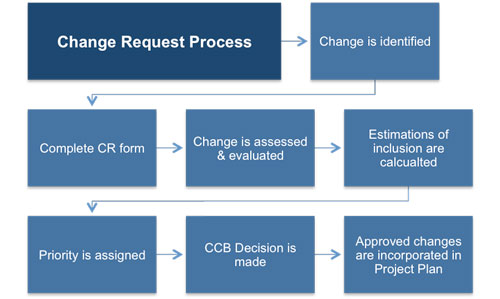
Change Management Plan Template
This template allows a project manager to control, manage and monitor change requests that occur throughout the life of a project.
A project change management plan will be developed in the planning phase of and names the individuals that are responsible and involved in the whole process of recording, managing, assessing and monitoring change requests. The project sponsor and project manager play key roles in this process and the development of this plan. Its purpose is to minimize ‘scope creep’ by allowing only approved changes to be implemented so any alterations to the project schedule, resources, budgeting, risk assessment or quality control are negligible.
Every project plan is subject to changes the key to success for a project manager is to ensure that changes are properly assessed, managed and monitored. Projects do not exist in a vacuum and they need to respond to changes in their project environment. The key to success is ensuring that your project changes are only essential ones that are needed to guarantee the project objectives are met.
The risk and damage that ‘scope creep’ and ‘gold plating’ can inflict on a project are well known and documented and this is why successful project management methodologies have a change control process. Without such a process the essence of a project can change beyond all recognition and fail to meet its objectives. This process must form part of the initial planning of the project and be agreed and followed by all key personnel involved in the project, from the project team to stakeholders.
Project changes must add real value to the performance baselines and project plans they cannot be ‘whims’ or ‘nice to haves’. It is up to the project manager and the project sponsor to communicate accepted project changes to the stakeholders and in such a way that meets their expectations despite certain project deliverables having changed. The nature and frequency of communication will be defined in the communications plan.

Therefore the purpose of the change management plan is to guarantee that all changes are presented in the same way through the use of the change request form and that they are logged in the change request register that keeps a track of each change request and its status. The introduction of this plan describes the background to the project along with is objectives. It outlines why it is needed and what organizational goal it helps to or completely fulfills and how this fits into the organization’s strategic plan.
The change management plan then goes on to describe the principles and ethics that form part of its process. It states what the organization will achieve by adhering to this process. This could be a wide variety of things for example, proper and meaningful sharing of information or proper engagement between departments to ensure the organization is successful. The process also states the principles behind its implementation such as proper inclusion of relevant parties and true consultation of interested parties. It also addresses any ethical issues that are affected by changes and ensure that no detrimental impact occurs as a result of an approved change.
When an individual requests a change to be made to the project scope the component of the project plan it implicates must be clearly stated. In many cases it will have implications for more than one component and the impact must be clearly defined for each one. These components consists of such things as the:
• Personnel in the organization
• Customer relationships or service levels
• Cultural impact to the organization or business relationships
• Impact of using new or different technology
• Documentation, legal or legislative requirements
• Operational processes & procedures
• Alterations to skills required & ability to retrain within the desired timescale.
Once the CR form has been submitted to the Change Control Board (CCB) or equivalent group in the project organization a detailed evaluation of how the requested change impacts and alters the current project baselines is conducted. The interests of stakeholders must be taken into account at all times and plays a significant role in the decision making process as to whether or not the change is approved. Part of a change request assessment includes looking into the degree and level of support it has within the organization and external influences. For example, could new legislation make the change essential to avoid compliance penalties or is the level of dissatisfaction with current operations so high that the requested change removes this?
Once the CCB has made its decision, this is then communicated to all necessary parties. If the change is approved then all relevant project baselines must be amended to take account of the approved change and alterations to their individual plans communicated to all necessary individuals and organizations.
The change management plan ensures that all suggested changes are logged, assessed, monitored and managed to ensure the project remains on target and to budget. It is also responsible for consolidating this change into the performance measures, polices and procedures that currently exist. This will ensure that any barriers within the organization are minimized if not removed so that the benefits can be attained.

